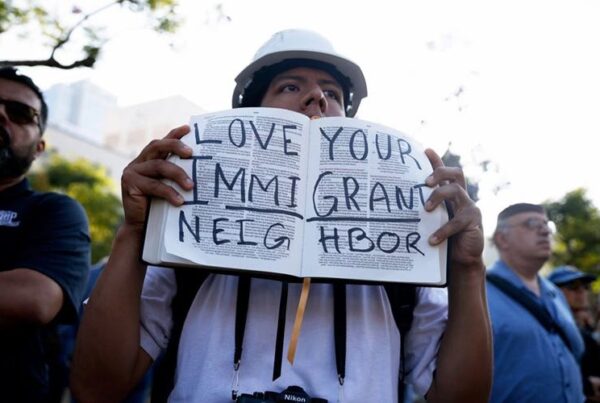Bigger than the Ballot is a Chasing Justice series about how to collectively work toward the love, justice and peace of Jesus in the public sphere. In this two-part blog series, Katie Nguyen Palomares explores what it looks like to seek shalom together in the midst of division and disagreements.
Our world keeps throwing more and more at us to consume, to consider, to heal from…and it seems like there’s no scarcity of voices ready to condemn, to fight, or even to kill the “other.”
How do we stand for life in the midst of all of this? How do we maintain our own humanity while our country is continuing to support genocide? How do we love our neighbor?
No…really. How?
Something that’s been popping into my head a ton over the course of this year is the conversation Kathy Khang and Matt Mikalatos have about shalom in their book, Loving Disagreement: Fighting for Community Through the Fruit of the Spirit.
But…What is Shalom?
Matt shares about a time when he was hosting a conference for Christian college students at a ski resort. It was the off season, and they found themselves sharing the space with a Hasidic Jewish, college group.
Matt shares about tension between the two groups when they held differing opinions and struggled to know how to best interact as they shared space. He shares details about how they arrived at a place, not of agreement, but of “mutual understanding.”
But then, Matt shares an extra story:
I was out walking on the mountain and crossed paths with an older rabbi who was there to teach in Eli’s group. As I passed him, I nodded and said, ‘Shalom.’ Shalom is the Hebrew word for ‘peace,’ and it’s a common greeting and farewell in Jewish circles, especially Orthodox Judaism. It’s a wish of peace to another person, and usually the response is to say ‘Shalom’ in return. / The rabbi looked at me very carefully, nodded, and then said ‘Thank you.’ (p. 55)
Matt’s response is about the same as when I read it: “Huh. That was weird,” (p. 55). Growing up around the Church, I had heard the mutual exchange of “shaloms” before. “Thank you” wasn’t the usual response. The explanation behind the interaction has been ringing in the back of my mind since I first read the book:
‘He didn’t wish you shalom because shalom might not be so good for you…When God finally puts everything to right and repairs the world, Eli explained, then we’ll truly have shalom. But inherent in the idea of true peace, of shalom, is the idea that the coming of shalom may not be universally accepted as a good thing.’ (p. 55-56).
I’ve encountered plenty of Christian platitudes that talk about wanting Jesus to come back soon, wipe every tear away, and enact once-and-for-all righteous justice. Having been around the church in the South, and working at different churches over the years, I’ve heard plenty of pastors mention how Jesus is the Prince of Peace, the bringer of shalom, and the general call for peace on earth.
However, there is often a huge missing piece in those calls: What does shalom peace actually look like on earth? What is our part in bringing shalom to our communities?
Shalom…in 2024?
Matt’s story touches on something that is both imperative and deceptively complicated:
Humans do not all think alike.
Christians do not all think alike.
We do not all come to the same conclusions all the time, in regards to theology or practice.
However, I do believe that Christians share a collective desire for a world of shalom—for conflict to not only be absent, but for things to be set as they should be. That should be the starting place for conversation and action. But it’s never that simple and often complicated. Just like Eli explaining to Matt that shalom “might not be so good” for him. Before, I didn’t consider what shalom actually looks like for different pockets of people. Jesus’ peace being ushered into the world, on earth as it is in heaven, doesn’t look like everyone all of a sudden holding hands and breaking into song together.
Shalom reaches beyond an absence of conflict: It’s the world actively being put right. All things as they should be. That isn’t a painless process and it will be more costly for some.
Much like the actual process of giving birth, discomfort, pain, and even trauma, is an unavoidable part of bringing peace into the world. It’s not enough to simply wish a platitude of “peace” onto someone we disagree with and believe we’ve participated in shepherding the Kingdom to earth. Some of us are going to have to give up, change our minds, or die to our comforts more than others.
Our faith has a rich tradition of turning things upside down: Of the strong, the resourced, and the well-connected among us using our strength for the benefit of those in lower positions.
“Now all the believers were together and held all things in common. They sold their possessions and property and distributed the proceeds to all, as any had need.” – Acts 2:44-45
Our faith isn’t a faith of little kingdoms. It is one of collective freedom and collective flourishing. The sanctity and dignity of life threatened anywhere is an affront to our God, and should mean a call to action for his people. We are called to straighten paths that are crooked and strengthen those who are weary so that all may experience freedom on earth as it is in heaven.
If one is oppressed, then we are not yet free.
If our children are being murdered, then we are not yet free.
If our systems still favor the established, the resourced, the colonizers, then we are not yet free.

Katie Nguyen Palomares is a Mixed Vietnamese/White activist, writer, and preacher currently living in Austin, TX. She serves as the Program Manager for Kingdom Capital Network, supporting primarily Black & Brown small business owners to make a Kingdom impact in their communities through their work. She also serves on the Digital Team for Chasing Justice and co-hosts The Beauty In-Between podcast with her husband. She earned her M.A. in Christian Leadership from Dallas Theological Seminary and her B.A. in English with teacher certification from Texas State University.
The views and opinions expressed on the Chasing Justice Blog are those of the authors and do not necessarily reflect the official policy or position of Chasing Justice. Any content provided by our bloggers or authors are of their opinion and are not intended to malign any religion, ethnic group, club, organization, company, individual or anyone or anything.







